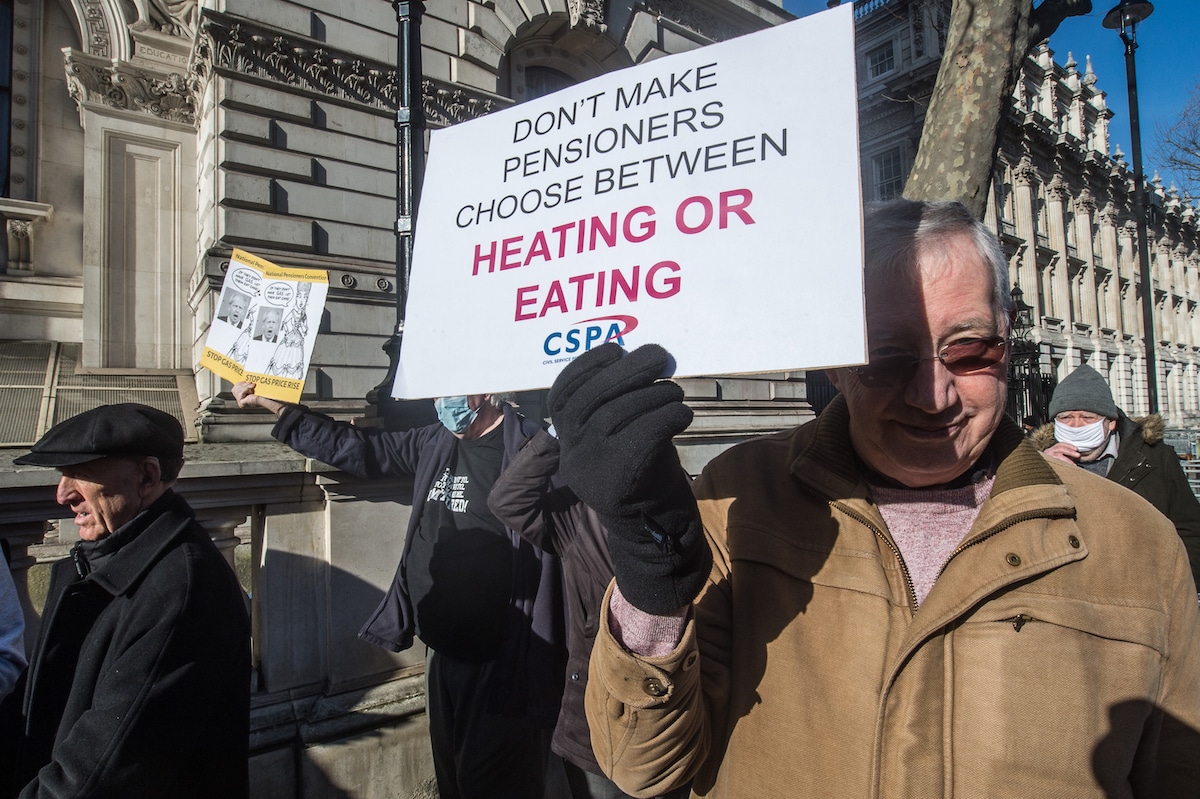Energy Crisis Forces UK Regulator to Raise Price Cap, Putting Lives and Livelihoods at Risk

 Why you can trust us
Why you can trust us
Founded in 2005 as an Ohio-based environmental newspaper, EcoWatch is a digital platform dedicated to publishing quality, science-based content on environmental issues, causes, and solutions.
As the energy crisis prompted by Russia’s invasion of Ukraine continues, people across the UK are in for a cold, expensive and potentially deadly winter.
British energy regulator the Office of Gas and Electricity Markets (OFGEM) announced Friday that the cap on household energy prices would rise by 80 percent beginning October 1, to £3,549 per year for an average household. Advocates warn that this will put additional pressure on ordinary Britons already struggling to make ends meet.
“Everyone we speak to thinks that the price increases we’ve seen and are going to be seeing on Oct. 1 are beyond a joke and will push people to the edge,” Jeffrey James, an organizer of the movement “Don’t Pay” to get one million people to agree to an energy-bill strike October 1, told The Associated Press. “We are being forced into poverty, whilst others who are already in poverty will be forced into a life-or-death situation this winter. That is the level of discontent and despair we are talking about.”
The energy price cap is set by British law to define the maximum that energy suppliers can charge households per unit of energy, OFGEM explained. It is calculated based on how much it costs suppliers to buy gas wholesale and then provide it to homes. Because wholesale gas prices have increased first as the world emerged from the coronavirus pandemic and then as a consequence of Russia’s invasion of Ukraine, the cap has risen as well. It is likely that the cap will rise even further in January.
“We know the massive impact this price cap increase will have on households across Britain and the difficult decisions consumers will now have to make. I talk to customers regularly and I know that today’s news will be very worrying for many,” OFGEM CEO Jonathan Brearley said in the announcement. “The price of energy has reached record levels driven by an aggressive economic act by the Russian state. They have slowly and deliberately turned off the gas supplies to Europe causing harm to our households, businesses and wider economy. Ofgem has no choice but to reflect these cost increases in the price cap.”
Brearley joined grassroots activists and experts in calling on the government to offer additional relief to customers who are having a hard time paying their bills.
In the spring, the government announced a £400 energy-bill rebate for all customers and a further £650 for low-income households, BBC News explained. However, prices have only continued to climb since then. The crisis comes as the governing Conservative Party is set to select a new Prime Minister September 5. Both top candidates Liz Truss and Rishi Sunak have promised to give struggling households more support but have not detailed their plans.
“I am begging and praying and pleading that there is more government help this winter so that people do not die,” financial journalist Martin Lewis told BBC News.
The rising gas prices are part of an overall cost-of-living crisis in the country, which has the highest inflation rate of all the G7 countries, The Associated Press reported. Overall, the energy crisis could have lasting economic consequences for the country.
“The impact to society will be higher than the 2008 crash in terms of the impact on households,” James Cooper, a partner at consultancy firm Baringa Partners, told Bloomberg. “We’re now moving into territory where a majority of households are placed into debt or a very fragile financial position.”
The energy crisis also comes as evidence of the climate crisis has become even more obvious, including in the UK, which saw its first day above 40 degrees Celsius in July. Some commenters have inaccurately blamed the high gas prices on UK climate policy, as Simon Evans of Carbon Brief pointed out in The Guardian. Others have argued that the UK should increase gas production in the North Sea to meet demand, according to Jamie Woolley of Greenpeace UK. However, Woolley points out that any gas produced in the North Sea wouldn’t necessarily end up serving UK customers — it would go wherever the company drilling it wanted it to go. Instead, he argued the crisis was another argument in favor of switching to renewable energy.
“It’s by moving away from gas, rather than pumping out even more, that energy prices will be insulated from global spikes and the threat of poverty will be lifted for millions of people,” Woolley said.
Subscribe to get exclusive updates in our daily newsletter!
By signing up, you agree to the Terms of Use and Privacy Policy & to receive electronic communications from EcoWatch Media Group, which may include marketing promotions, advertisements and sponsored content.

 233k
233k  41k
41k  Subscribe
Subscribe 




